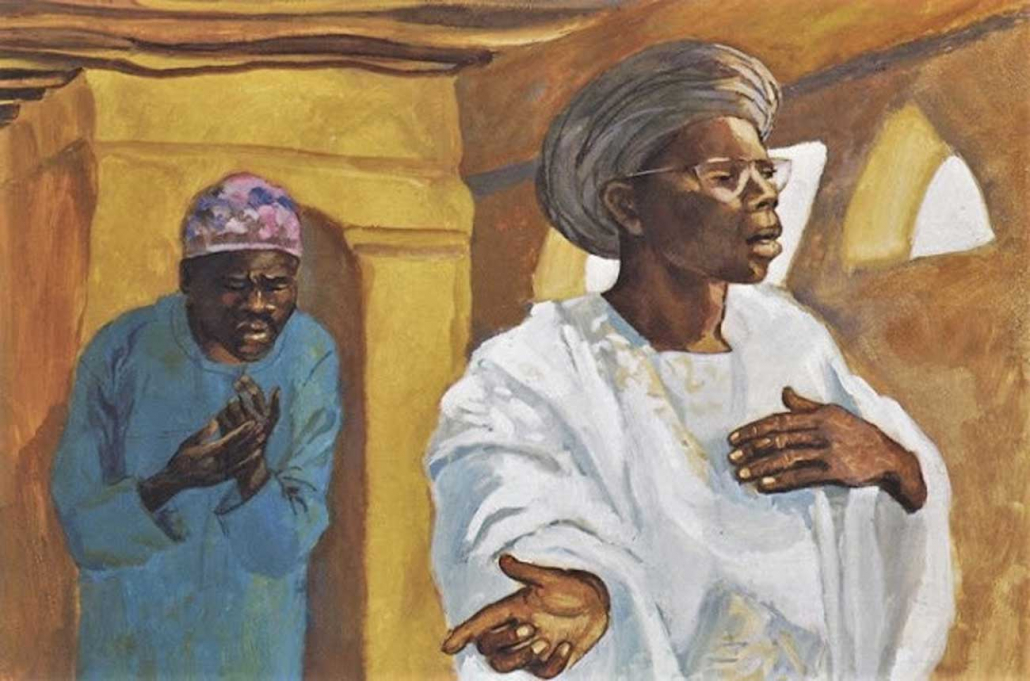Image: Jesus Mafa, The Pharisee and the Tax Collector. Cameroon, 1973.
‘Hymns to grace’
Andrew Collis
Ordinary Sunday 30, Year C
Luke 18:9-14
The tax collector’s prayer invites our humble prayers and heartfelt hymns to grace.
“We must not be haughty and smug [as is the Pharisee in the parable, though not, it should be noted, Pharisees as a rule], looking down on others, thinking we are better than them … like everyone else, we need the grace of God in our lives” (Henry Karlson).
“Two people came up to God’s house to pray. Only one really found the hospitality that was there” (Brendan Byrne).
The tax collector’s prayer, “O God, be merciful to me, a sinner” (we might call it a mantra) invites us on a journey to an ancient destiny … to be one with Christ in whom all achievement acts as a medium of relationship, in whom all may be forgiven, in whom all may flourish.
(The Jesus Prayer of the early desert fathers and mothers, a treasure of the Orthodox tradition, incorporates this tax collector’s prayer.)
By such practice we contemplate sin … which might be regarded a kind of theft – tearing/harming the web of relations, the kindom of heaven on earth. Socially, robbing others of resources, identity, opportunity, a future. Personally, pulling away from life freely given – desires and attempts to steal life, love, land, and more.
We contemplate sin that we might become wiser …
Blue Knot Day is about survivors of complex trauma. It’s about supporters and helpers too, all of us bearers of hope and healing.
This year, it’s about “nurturing mind, body and soul – exploring what we need” … it’s about wellbeing – simple, nourishing food, communion with the earth, sanctification or exaltation of country, awareness of greed, violence, foolishness as well as creatureliness, our being created and related, life in dialogue with saints, angels, ancestors … love as fundamental, subversive, transformative.
In response to the gospel, I imagine a mantra similarly focused on Christ, relationship, forgiveness/mercy, flourishing … and pray/confess: “O God, I cannot steal what is free.”
Together, we might offer humble prayers (of gratitude) for strength to speak honestly, bravely … prayers of resistance to abuse and all cruelty … prayers of healing, inclusivity …
Together, we might offer heartfelt hymns to beauty and dignity, to the undeconstructible, the divine spark, glory, gift … hymns to grace.
This is a folk song, with thanks to Norrie and Abner, called “Black Coffee”, which is a symbol, I think, for simple pleasures and safe settings …
A folk song dedicated to adult survivors and supporters, carers and counsellors, all of us “nurturing mind, body and soul – exploring what we need” – simple, nourishing food, communion with the earth, sanctification or exaltation of country, awareness of greed, violence, foolishness as well as creatureliness, our being created and related, life in dialogue with saints, angels, ancestors … love as fundamental, subversive, transformative. Amen.
Turkish bread with olive oil
Pots of black coffee
Compost to enrich the soil
You can’t steal what’s free
I reassure myself
When I’m hurt and angry
Or in poor mental health
No, you can’t steal what’s free
Who sanctifies the land
This wounded country
Let them take the stand
Now you can’t steal what’s free
More wealth than I can house
And none more creaturely
I cringe at all the harm I cause
Oh, I can’t steal what’s free
I borrow from the Bible
A Renaissance anthology
Of poets unoriginal
So I can’t steal what’s free
I read the texts and signs
That say you love me
The vanity love undermines
And I can’t steal what’s free




